#ic markets regulation
Explore tagged Tumblr posts
Text
PWHL 2024-2025 Primer
It's that time of year again folks. PWHL starts on November 30th.
The sections of this primer are: What is the PWHL, Where can I watch, Rules/League Structure, Official league pages, journalists to follow, and an introduction to each team (what they did last year, who's on the team, notable players, you should root for them if you..)
What is the PWHL?
The Professional Women's Hockey League was created in 2023 and launched in January 2024. It is currently the sole professional women's hockey league in North America.
Heading into the 2024-2025 season, the PWHL has six teams: The Toronto Sceptres, Boston Fleet, Minnesota Frost, New York Sires, Montréal Victoire, and Ottawa Charge. Each team plays 30 regular season games per team. You can find the full season schedule here.
Where can I watch?
Disclaimer; We don't have an official 100% confirmation on the American and non-North American ones yet, just reports from journalists who I do deem trustworthy. I will edit any changes and highlight them in bold if necessary.
On Television/Streaming
Canadian fans will have games on TSN and its affiliates (such as TSN+) primarily, with select games on CBC and Prime video.
French broadcasts of Montreal games can be found on RDS (18), Radio-Canada (6) on ICI TÉLÉ and ICI TOU.TV
Full streaming/television schedule for Canada
All fans not in Canada are available to stream on the PWHL Youtube regardless of location (so if you're "in market" there's no black outs like there is NHL games)
Last year regional games were held on: Bally Sports North in Minnesota, NESN/NESN+ in Boston, MSG/MSG+ in New York, Sportnet Pittsburgh has carried select games. Not 100% confirmed this will be the case last year. Even if your regional sports network carries it, however, you should be able to access it on Youtube in America
In Person
Toronto and New York (sort of) have new locations this year
Toronto Scepters play at Coca-Cola Coliseum
Ottawa Charge play at TD Place
Montréal Victoire play at Place Bell
Boston Fleet play at Tsongas Center (Lowell, MA)
Minnesota Frost play at Xcel Energy Center
New York Sirens will play at Prudential Center (Newark, NJ)
There are also many neutral site games this year including Detroit, Quebec City, Raleigh, Vancouver, Denver, Buffalo, St. Louis, and Seattle that you can read about here
What are the rules? The League Structures?
Who makes the playoffs and what do they look like?
Please keep in mind that with such a young league, it's possible this will be tinkered with.
Each game is worth three points: 3 for a regulation win, 2 for an overtime win, and 1 for an overtime loss
Last year, the PWHL had 4 of the 6 teams make the playoffs. The number one seed got to choose their opponent between the third and fourth seed.
All series were best of five series, the two semi finals and then the finals.
Rules
If you are an NHL fan looking to jump in, here are the differences in the PWHL. The rulebook is also here.
Bodychecking is allowed in the PWHL, so long as it is done in an attempt to play the puck or gain possession. While women's hockey has always been physical, bodychecking at this level is fairly new, the SDHL in Sweden started to allow it just in 2021 and then the PWHL last year, so refs and players are adjusting in how they're going to draw the line between legal and illegal. This is also not the case in international competition, so it is a little different than the olympics or worlds if you are used to watching those.
The PWHL has a "jailbreak rule" which means that if you are shorthanded and score, the penalty ends.
In shootouts, a player can go as many times as they'd like.
New this year is the "No Escape" rule where players of a penalized team are required to stay on the ice to start the penalty kill.
Coaches can challenge delay of game puck over glass penalties.
Hits to the head, headbutting, and grabbing an opponents helmet strap, throat protector, or hair is an automatic major penalty and game misconduct.
What are the official social media pages? Who are good people to follow?
Official league pages:
PWHL: Instagram / Twitter / Tiktok / Youtube / Website
There's also a unofficial bluesky bot that re-posts all of the PWHL X content
Sceptres: Instagram / Twitter / Tiktok / Youtube / Website
Fleet: Instagram / Twitter / Tiktok / Youtube / Website
Victoire: Instagram / Twitter / Tiktok / Youtube / Website
Frost: Instagram / Twitter / Tiktok / Youtube / Website
Sirens: Instagram / Twitter / Tiktok / Youtube / Website
Charge: Instagram / Twitter / Tiktok / Youtube / Website
News and Journalists:
This is not a comprehensive list, just a starter pack! feel free to add any recommendations in the comments.
Kyle Cushman: Works for the score, covers the whole league (as well as some nhl), keeps public statistical information. The Score author page / Twitter / Bluesky
The Ice Garden: Long time women's hockey publication. I'd also recommend going through their contributor/author page and following them individually! Website / Twitter / Bluesky
Hailey Salvian: Long time reporter for the Athletic for women's hockey Twitter
Kenzie Lalonde: TSN reporter based in Montreal covering PWHL among others, also does play by play Twitter
Rick Menning: Local reporter for the Sirens Twitter
Kelsea Durham: Local reporter for the Boston Fleet for Inside the Rink Linktree
Christine Roger: French-Canadian reporter, who posts in French, mainly about Montreal Twitter
PWHL Report: Content aggregator for if you don't want to follow a bunch individually and really the only one i've seen post stuff to Instagram Twitter / Instagram
Who are the Boston Fleet?
The Boston Fleet were last years runner up in the league.

Their roster can be viewed here, with updates to be expected in the next few days as training camp cuts and contract being signed, the waiver period starting for teams to sign players that got cut from other teams training camps, and final rosters are made.
Notable players: Hilary Knight (captain), Aerin Frankel (Star goalie), Alina Müller (Swiss hockey star), Hannah Bilka (first round pick this last draft.)
You should root for this team if: You like defense-first hockey, strong New England college hockey connections, rooting for the youngest ice hockey player to win an olympic medal (Alina Müller), a player who got a custom outfit for pride night (Jamie Lee Rattray), Jewish hockey icons (Aerin Fankel), and players who are also podcasters and make a lot of tiktoks (Lexi Adzija and Taylor Girard)
Who are the Montréal Victoire?
The Montréal Victoire finished second in the standings last year, where
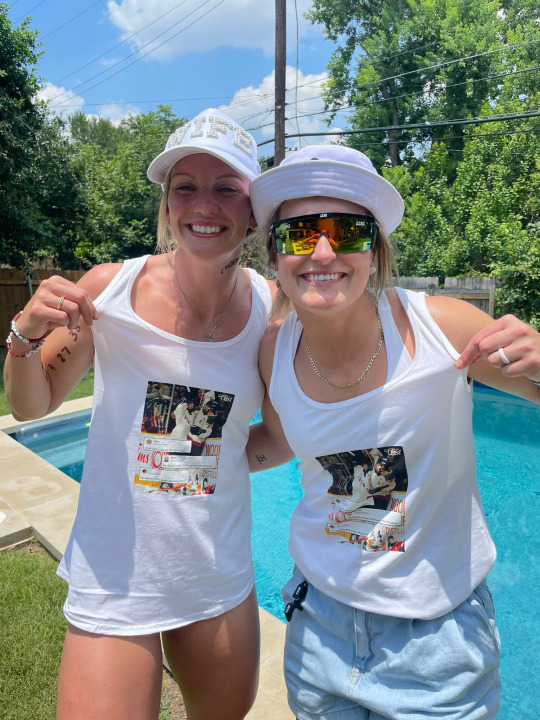
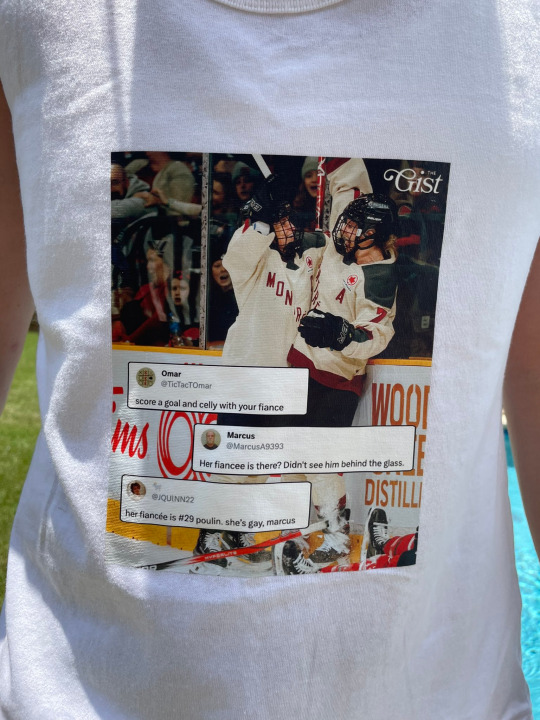
Live roster viewable here with expected updates the next few days
Notable players: Marie Philip-Poulin, Laura Stacey, Erin Ambrose, Ann-Renée Desbiens (all four are long time Team Canada legends), Lina Ljungblom (young Swedish superstar), Mikyla Grant Mentis and Kennedy Marchmand (both former PHF MVPs)
You should root for this team if: You love two way defensive minded centers, rooting for the league favorite, star players who are married to each other (Poulin and Stacey), short defenders (5'1 Amanda Boulier and 5'2 Cayla Barnes), post game victory dances, I dont even know how to describe this but heres grant mentis and Lásková watching golf i have to put it here
Who are the Toronto Sceptres?
The Sceptres were the first place team in the PWHL last year.

Roster here, once again will change this week
Notable players: Natalie Spooner (league MVP and long time team Canada player), Sarah Nurse (Olympic record holder for points and top scorer), Julia Gosling (first round pick), CJ Jackson (backup goaltender, social media darling, and LGBT activist), Renata Fast (top defender for both PWHL and Team Canada)
You should root for this team if you: love all the Team Canada players who grew up outside Quebec and also the coaches (all but three players are Canadian and many have played internationally for Canada, the coaching/management also largely from team canada and shares stylistic similarities), are interested in Nursey Nights (Sarah Nurse's collaboration with Black Girl Hockey Club during Toronto Sceptres games!), want to root for the other league favorites, love noted pancake enthusiasts (Kali Flanagan), or if you're more on the savory side, love a hot dog enthusiast (CJ)
Who are the Ottawa Charge?
The Ottawa Charge finished fifth in the league last season
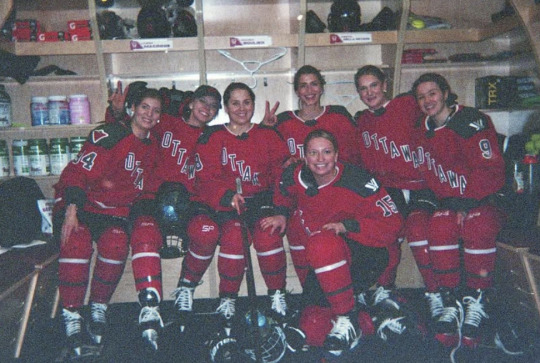
Roster here with updates to come
Notable players: Brianne Jenner (team Canada and captain of Ottawa), Emily Clark (top scorer), Kateřina Mrázová (top scorer and Czech national team icon), Danielle Serdachny (second overall pick), Ronja Savolainen (Finnish national team mainstay and SDHL icon)
You should root for this team if you: Have an interest in Czech players (Mrázová, Vanišová, Tejralová), you like podcasting players (but gay this time), enjoy a team that regularly updates their youtube channel and does a fan fest and has some of the best player created content, like a team that is not afraid to make bold roster moves
Who are the Minnesota Frost?
The Minnesota Frost are your inaugural PWHL champions!
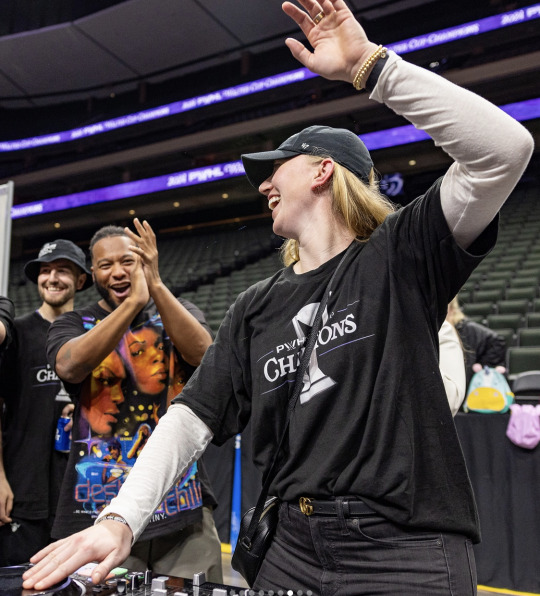
Here is a live, updating roster
Notable players: Kendall Coyne (Captain, Team USA), Taylor Heise (last years #1 overall pick and one of the leagues scorer), Grace Zumwinkle (also a top scorer), Nicole Hensley (star goalie and also Team USA starting goaltender typically), Michela Cava (extensive experience as top player in PHF, SDHL, and Russia.)
You should root for this team if you: Have a lot of midwest pride and like teams in the WCHA, value speed when watching hockey, like players with unconventional paths to stardom (Hensley, who played at Lindenwood in college and made team USA only after college finished), want to root for the ultimate playoff sicko (Michela Cava, who has 4 championships across four leagues, two finals MVPs, and is over a point per game combining all playoffs), like franchise cornerstones who are besties and call each other 'the dog to their cat" and vice versa (Heise and Zumwinkle)
Who are the New York Sirens?
The New York Sirens finished last in the PWHL last year
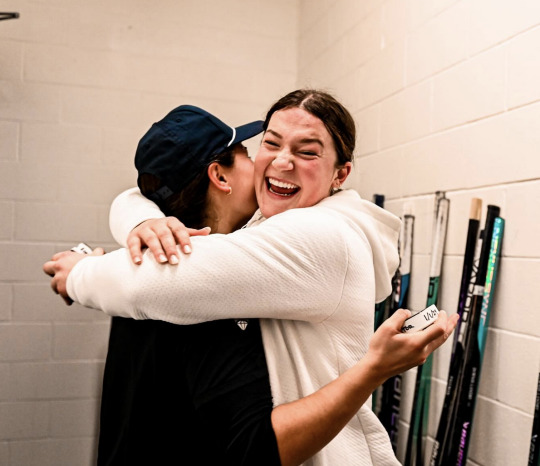
Roster with updates to come
Notable players: Abby Roque, Alex Carpenter (both team usa and PWHL top scorers), Corinne Schroeder (had the best goaltending season in PHF history in 2023 and followed it up by having one of the best PWHL seasons despite a tough workload), Sarah Fillier (first overall pick this year, team Canada star), Maja Nylén Persson (round two pick, SDHL best defender of the year last year, team Sweden's #1 defender), Noora Tulus (finnish national team star and one of the best SDHL players of all time.)
You should root for this team if you: want to see a team really build itself up from the ground floor, as theres a lot of roster turnover this year and a new coaching staff, with a lot of exciting draftees. like a team that has a little more physicality/grit. want to maximize the number of crossovers with other professional sports teams possible, like the nickname pizza rats. Want to enjoy some of the best mic'd up content (Roque)
#pwhl#boston fleet#minnesota frost#montréal victoire#toronto sceptres#ottawa charge#new york sirens#hockey#women's hockey#scheduled post..lets hope no news comes out between when im scheduling and when its posted#long post
369 notes
·
View notes
Note
HIIII.. your write rlly good for autistic reader so i would like to request lads boys with an autistic reader that gets overstimulated and accidentally gets angry them? when i am overstimulated i get really angry so i feel bad,,, (hi fellow autistic gals)
Thank you so much �� and yes I can!
In all of these headcanons, it is assumed that each love interest is aware that the reader is autistic and experiences overstimulation on occasion.
Sylus – temperature dysregulation (hot)
It was midsummer in Linkon and you feel like you are boiling in your flesh suit.
You have always had issues with temperature regulation. You get hot from the smallest amount of physical exertion, from eating warm foods, or being outside long enough when the sun is shining. And then you begin to sweat. Being hot and sweaty makes you irrationally angry, and you can’t help it.
Usually, you bring a portable fan and wear tank tops to avoid becoming a sweaty mess. In the summer even these things don’t save you. And today is one of those days.
You are out with Sylus at a summer market in Linkon city. He is wearing a pair of dark sunglasses, a tank top, shorts and sandals as you two peak at the stalls you pass by.
You were so hyped when you first got here because usually Sylus is sleeping during this time of day. But he was willing to sacrifice his sleeping schedule to see you smile.
You have been walking around for an hour, indulging in free samples being handed out and stopping at any stall that catches your eye.
But your blissful afternoon is interrupted by the all too familiar feeling of your body heating up past the point of comfort. You feel agitated and upset that you can’t just enjoy a day out without heating up and getting sweaty. And unfortunately your irritation leaks into your conversation with Sylus.
“Which booth would you like to check out next kitten?”
You let out an audible sigh before replying. “Why do I always have to choose?” you ask harsher than you would have liked.
Sylus pauses at your tone and takes in your body language. Your face looks flushed, you’re starting to fan yourself with your hands, and you have an adorable grumpy expression on your face. He knows what this means.
Instead of commenting he begins to steer you back towards the parking lot, so he can get you back home in a cool environment. He also makes sure to turn on your AC via the smart thermostat he installed in your apartment.
“The booths are that way you know,” you say quietly.
“I know sweetie, but right now I think it’s time for us to go home.”
Instead of acknowledging his response with an answer you focus on fanning yourself with your hands. And lifting your arms up so your armpits can get some air. You blessedly arrive at his motorcycle and after a quick ride you are home once again.
When you arrive back at your apartment you sigh in relief because the air conditioner is already on. Without saying a word, you head to your room and begin to strip down to your undies so you can cool down completely.
Sylus walks to your kitchen to get you a glass of water with ice in it, he’s very familiar with this routine. After giving you a few minutes alone, he brings you the glass of water with adoration in his eyes.
“…I’m sorry. I got so hot and it made me upset. You didn’t deserve me taking it out on you.”
Sylus leans towards you and gives you a smooch.
“I forgive you. Now, drink this glass of water and continue to cool down for me okay?”
Zayne – being tired + in pain
You are beyond tired, there is a large gash on your leg and you’re sitting in urgent care at Akso hospital. The mission you just completed was rough to say the least. As you sit in the waiting room marinating in your misery, you decide that you’ll request a vacation once you’re all patched up.
You can almost feel your social skills slip through your fingers. It’s taking more effort than usual to keep up the niceties when you interact with the hospital staff, but you manage to do it. Just barely.
And when you are finally ushered into a room, the bright fluorescent lights instantly give you a raging headache.
As you close your eyes and cradle your head in your hands you consider going home instead of waiting for the doctor to come in.
You hear the door open, someone walk in then the door close once again. But you don’t bother looking up.
“What damage has your body sustained this time?”
Zayne’s voice is usually very soothing to you. But today his voice feels as smooth as sandpaper on your nerves. You cannot take his teasing at this moment because way too much is going on. You are overwhelmed.
“It’s not like I seek out ways to get hurt you know,” you reply petulantly.
Before he can reply, you can’t stop yourself from continuing “Also who thought it was a good idea to install these blinding lights? My eyes feel like they’re going to explode.”
Zayne silently observes you as he lets you vent. He turns off the lights in the room and opens the curtains so now there is only soft light coming in from the setting sun.
He then turns to you and speaks in a hushed tone. “Is this natural lighting more tolerable? I had to open the curtains so I can inspect your wound.”
You nod your head.
“Let me clean up and cover your wound then I will grab some aspirin for your headache.”
With the threat of the overhead lights gone, you finally open your eyes and look towards Zayne. “Zayne, I’m sorry for snapping at you. Everything just felt like too much at once.”
Zayne lets a small smile reach his lips. “I can tell when you’re overstimulated my love. No need to be sorry for things that are outside of your control. You were my last patient for the day, let’s go home together.”
Rafayel – crowded places
You are attending one of Rafayel’s gallery shows near the beach.
You, for the most part, came to support your lovely boyfriend but you also came at the urging of Thomas because “If you don’t come, Rafayel will not show up.”
The gallery is more packed than usual, with the news of Rafayel making an appearance spreading like wildfire through the news.
Rafayel is currently occupied by conversation with someone interested in buying one of his paintings. You wander over to the refreshment table to grab another flute of champagne.
You feel antsy from the amount of people at this gallery showing. The sensation of being trapped is putting you on edge. As you chew on your bottle lip and take a sip of your drink, you contemplate making a quick exit and apologizing to Rafayel later.
As you scope out the exits, you hear his familiar voice behind you. “Where are you heading off to cutie?”
Your heart is pounding in your chest, and you feel like you are under attack. “Coming here was a mistake. I feel like I can’t breathe,” you say quickly. You avoid his gaze because you know your words hurt him.
Before he can reply you rush out of the gallery and make your way down towards the beach before plopping down on the sand. Your dress be damned.
Watching the waves lap against the sand helps center you. After a few minutes you hear the crunch of sand as someone approaches you. You know it’s Rafayel because he is the only person who sits so close to you, both of your knees touching.
Both of you are quiet for a beat because he speaks up. You tense as you ready yourself for the backlash of your harsh words. But you are surprised at what he says.
“It really hurts when you run away from me” Rafayel says in a soft tone.
You feel like a piece of shit because you know Rafayel has abandonment issues. And you unintentionally played into them this evening.
You feel even worse once you look in his direction and see his signature pout and puppy dogs in full effect.
“Rafayel I’m so sorry. I thought I could handle being around all those people but it became too much for me to handle.”
Hearing your sincere apology softens the blow of your actions. “I figured that’s what happened. We didn’t expect there to be such a large turnout for this showing.”
“You know I would never purposefully put you in a situation that causes you distress, right?”
“I know.”
You two sit in companionable silence after reconciling.
“Do you want to take a stroll along the beach with me?”
“Don’t you have to stay at the gallery showing?”
“Ehh, Thomas can take it from here,” he replies nonchalantly.
With that you two stand up and walk hand in hand along the sand.
Caleb –loud noises
You are enjoying the atmosphere at the Linkon New Year festival with Caleb.
You still can’t believe that he’s back in your life after believing that he was dead for a year straight.
You have exhausted yourself from trying to visit every booth.
Before you know it, it is nighttime, and everyone is walking towards the open lawn to watch the fireworks show.
You turn to Caleb to ask if he wants to leave when he interrupts you by speaking first. “Will you be okay with watching the fireworks show before we head home?”
You swallow your own question after seeing the smile on his face, you don’t have the strength to deny him anything. But you’re not sure if you can handle how loud things are going to get.
“Sure,” you say with a tight smile as you dig through your bag for your earplugs. Your heart drops when you recall that you changed bags this morning. You are now woefully without ear protection. You feel like crying but decide to push through, not wanting to disappoint Caleb.
The fireworks show starts off fairly tame. But the loud boom from each firework frays your nerves and fills you with anxiety and dread. You feel like a cornered animal in a cage.
Caleb suddenly gets close to your ear. “What’s the matter pipsqueak?” He shouts in an attempt to be heard over the continuous fireworks.
The volume of his voice makes you jump and shout back “Get away from me!” Before you take off running through the crowd, towards the parking lot. This moment reminds him of a time in your childhood when you reacted the same way. You were overwhelmed and he refused to leave you alone in this state.
Caleb extensive exercise regimen kicks in as he catches up to you in no time. You have shakily climbed into the passenger seat of your car.
When he gets into the driver’s seat, he turns towards you with concern furrowing his brow.
“How are you feeling?”
“I feel okay now,” you reply quietly.
“Maybe we should look for some new earplugs for you. They didn’t seem to help much during the fireworks show.”
“I forgot to bring them with me today.”
“Ahh well that explains it. Why didn’t you mention it to me? We could have left early”
“I didn’t want to disappoint you.”
Caleb sighs and shakes his head in amusement. “You could never disappoint me princess. Let’s go home. I’ll make you some chamomile tea when we get there.”
You nod your head and buckle your seatbelt. The ride back to your apartment is filled with companionable silence. Nothing else needs to be said. Caleb accepts you for who you are, and he prioritizes your wellbeing above all else.
Xavier – lack of sleep
It took:
six fucking days
to track down and kill a wanderer that was causing havoc in remote town.
You learned during your investigation that this wanderer appears randomly, but always at night. You and Xavier have been taking turns patrolling.
You learned during your investigation that this wanderer appears randomly, but always at night. You and Xavier have been taking turns patrolling.
Your body, mind and soul are beyond exhausted. And you feel ready to take a week long nap in your bed.
As you finish compiling your report you are fighting to keep your eyes open. Once you send your report to Jenna you see Xavier approaching your desk from your peripheral vision.
“Hey, do you want to stop at the hot pot restaurant on the way home?”
The irritation you feel from lack of sleep reaches a boiling point. You don’t know what comes over you, but you just snap.
“Do you ever think of anything besides food? I am going home then straight to bed.”
Although it felt good to release that pressure and frustration. You regret directing it towards Xavier, especially when you look his way.
The soft and open expression you’ve grown accustomed to is gone and replaced with the blank and closed off one that he wore when you first met him. His lips are tensed in a straight line and his beautiful blue eyes are intently focused on you.
As you open your mouth to try to salvage things, Xavier interrupts you.
“Okay. How about I get us both home and while you sleep I’ll put some takeout in your fridge? When you wake up you won’t have to make anything,” he says in a monotone voice.
You feel tears pricking your eyes. Xavier is incredibly understanding even during the moments you misdirect your anger towards him.
“That sounds good. Thank you for being patient with me.”
“Like my love, my patience for you is limitless. Let’s leave, you need your rest.”
#love and deepspace#lads#lnds#l&ds#love and deepspace x you#love and deepspace x reader#sylus x reader#zayne x reader#rafayel x reader#caleb x reader#xavier x reader#headcanons#anonies#asks#monster-effer
271 notes
·
View notes
Text
(O.O ) The PONDERING is back!
You know Walker?
One of the Zone's literal ACAB? We are shown in one episode, that real world items? Against The Rules(tm).
Now, that COULD just be HIM being An Asshole? But let's be real! Unlikely. Rules/Laws get made for a REASON, generally. Usually because someone ruined it for everyone by being an asshole. Taking things too far.
You start OUT with the obvious Rules. Like "Don't Tear the Zone Apart." And "No Genocide of Literally Everything Forever You Fighty Little Assholes" but over time? You have too add stuff. Like "George is Forbidden to use the fax machine and he knows why" and "Ice Lairs and Fire Lairs have to be X distance apart AND YOU KNOW WHY"
And? IS there a central Governing body, regulating the Zone Rules? Nope! Pariah's in nappy time! BUT the manic, Iron fisted, Obsessions of THE LAW across time and space are sure willing to step up and help keep order. It... KINDA works!
And they MOSTLY have the same-ish Rules!
Like NO FUCKIN LIVING WORLD STUFF. Because? To GET such contraband? You'd have to break containment of the Zone, go THROUGH a random ass natural portal, that may or may NOT be safe, may or may NOT ever RECONNECT to the Zone, to literally terrorize the unsuspecting living souls (assuming you can FIND any), on the other side, JUST to drag that shitty candy bar back home.
Leaking ectoplasm the whole time. Poisoning the air, land, and sea. Making NEW ghosts where there might not have been any. Effectively making you their deadbeat parent. Which is premeditated child abandonment. And you DEFINITELY didn't PAY for those objects. Thief.
So, NO. No Living World Shit.
BUT!
Like city states! The Area of influence each Law Man(tm) has? While wide and sprawling? Does NOT perfectly mesh together like puzzle pieces! There ARE dead zones. Lawless, "unclaimed" areas.
Which? Are not so unclaimed.
For just as The Law has it's Obsession? So too, has the Underworld. Shaddy casinos and auctions. Black markets run like street fairs. What some Ghost Weed? They can hook you up, man. Vinnie over there was a Runner during Prohibition. He knows where ALL the classy joints are.
He can hook you up with some REAL nice Living World collectibles.
From All Over.
And? I bet it's that LAST bit? That REALLY sparks Danny's interest. He saved the guy from the GIW, who may or may not have busted him trying to... uuuuh... LIBERATE, some fine scotch for the bar back Zone side. Who's to say, really? Regardless, Vinnie? Pays his debts, you here.
Beside... the feral little gremlin kinda scares him. Good quality to have, no question, but maybe cool it with the biting? You don't know where they BEEN. You'll get a disease.
Now... all you gotta do, see, is... *mutters* *map scribbling* *bad idea enabling*
Which? Constantine! League Members of your choosing! Like a field trip from hell! Some how in the SINGLE shadiest den of Obvious Criminals you ever did see. The sky is green and they aren't in their dimension anymore. Circle up! NOW. Young Justice shoved to the INSIDE of the circle, adult heros on the outside.
Constantine? Knows where they are and wishs he didn't. He... he's not sure he CAN get them back. Going to try obviously. But no one panic. Don't show fear. DON'T TOUCH ANYTHING. Start walking.
Danny? Loading up the speeder~ Christmas gifts for daaaays~~☆ Everyone is Salty but respectful, cause anti-ghost tech meant they couldn't steal it. They did TRY. But... fair play, kid. Nice ride.
Only? Right before he gets in to leave? Some vibrating blur shoots over? Talking fast and followed by an older blur? Oh hey, humans. Like... ALIVE humans. Sup?
@the-witchhunter @hdgnj @nerdpoe @hypewinter @mutable-manifestation
#dpxdc#dp x dc#dc x dp#dc x dp prompt#danny phantom#justice league's very bad no good just awful road trip#danny does some Crime Shopping#at the Crime store#he got alternate dimension boy band stuff for Jazz#his mom's getting this cool lazer sword#dcxdp#minji's ponderings
629 notes
·
View notes
Text
Yandere Coworker (part 14)
Thank you @i---believe---in---pink for commissioning this chapter.
(2945 words)
tw: afab reader, infantilization, butchered Spanish,
Masterlists (+commission info), part 1, part 15
You're in Cyprus's car, munching on one of the many treats he bought you from the farmers market. It distracted you from how Cyprus would sensually knead your thigh as he drove.
The car is full of fresh vegetables and fruits that he bought, so he could make tastier meals for you and him. In his styrofoam cooler, rest slabs of butchered meat and numerous ice packs to keep them from spoiling, as the ride home is quite far.
He was talking about an anecdote, in an attempt to prompt you to open up to him. But his tactic has been failing for the past half hour, all you did was nod and eat.
Cyprus pursed his lips as he glanced at you from the corners of his eyes. You have exhausted his conversational topics and he has a whole arsenal of them. You're driving him insane! What does it take for you to talk to him about yourself? He failed to consider that you may not have a lot to say in the first place because he truly believed that you are complex and more than your internet addiction. He wants to know your thoughts, more about your likes and dislikes, your beliefs, family, friends... anything!
Then, he had an idea.
"We're not going home just yet."
You looked at him and asked what he meant by that. He merely smirked and stayed silent.
-
Cyprus didn't drive back to his apartment or yours like you expected. You knew it was close to his home, since you and he passed by this place to get there.
He pulled up to a dilapidated building, no doubt another apartment complex but older and dingier. The wall paint was chipping off, and windows were shrouded with overgrown trees and moss. Cars were haphazardly parked around the complex without regulation or visible parking lines.
He pulled on his handbrake and switched his engine off. You're still staring out the window, wondering where he took you.
"Baby." You turned around, to have him cup your cheek and gently pull your lower eyelid down with a thumb. You initially struggled against him but relaxed when you realized he meant no harm and wouldn't let go until he got what he wanted. Which was to examine your eyes.
He hummed, staring intensely at you. Making you blush at how attractive he appears to you now, you would be caught dead before admitting that to him. But you didn't have to, he knows what you're thinking and is fully aware of how he presents himself.
Cyprus checked the time on his wristwatch. He finally lets go of you and reaches for his center console, where he has tucked your medicated eyedrops away.
You complained, telling him that you could apply your own antibiotics. He merely clicked his tongue in annoyance and rolled his eyes as he uncapped the bottle. "Look up."
You didn't have to do anything, Cyprus was the one who tilted your head upwards while pulling a lower eyelid down. Sighing, you let him administer the drops in your eyes. It felt humiliating, yet secretly, you felt somewhat comforted to know someone was out there remembering these little details of you. If it wasn't for him, the thought of your medication would have completely slipped your mind.
You blinked hard, letting the liquid sting your eyes momentarily. You could hear the rustling of the pharmacy's paper bag as he kept your medicine away. He had also pulled a sheet out of his tissue box. "Stop that!" Cyprus hissed, pulling your hands away from your face as you instinctually went on to rub your eyes.
You grumbled, letting Cyprus coddle you; gently wiping the excess drops using the tissue and carefully picking the crust out from the corners of your eyes. You remained still for the entirety of this, allowing Cyprus to do whatever he pleases. Luckily, he's acting with the best intentions in mind.
"There, done." He crumpled the sheet of tissue and shoved it into his pocket to dispose of it later. Cyprus then kissed you on the forehead. "Good girl." Whispered praises and chuckling.
You didn't respond, but instead stormed out of his car and slammed the door shut behind you. Cyprus got out shortly after, he took out the styrofoam cooler from his trunk and a couple bags of fresh vegetables before locking his car using his key fob.
"Come on, let's meet tu suegra." He gestured for you to follow him to a dim stairwell, where the only source of lighting was the outdoors. Cyprus started ascending the steps with the bags in hand.
The cogs started turning in your head, you may or may not understand what he just said, but all hints are suggesting that you're now at his mother's place. You also noted how his American accent suddenly changed into a completely different one when saying those two words. However, looking back, he tends to roll his "R"s.
You tailed behind Cyprus, climbing the bare, concrete stairs with suspect hand railings. It's dusty and cobweb-ridden, but at least it's functional.
You and he eventually reached an open-air corridor, grateful for the sunlight shining the path for you.
"Here." He handed you a bag and knocked on the door. It seems like the plaque fell off, you could see the screw holes, but you have no idea what number unit this is. The other doors don't seem kind enough to give you hints either.
You held the bag of vegetables in your arms as you watched Cyprus knock again, trying to get the attention of whoever was residing behind it.
Silence blanketed over him as you were made to wait for any further developments. You opened your mouth to say something, but your ear perked up at the sound of the door unlatching and unlocking. An unpleasant creak of the hinges, and then a surprised gasp reached your ears.
"Mi-" The voice, aged and feminine, stopped midway. You peered over the bag to see a woman in her fifties, her grey roots are showing as it seems she hasn't refreshed her black dye in a while. Like Cyprus, she too, wore glasses and had the same beautiful set of grey eyes. Her eyebrows were thin, charmingly drawn on and her lips were in a deep shade of red, but they were pulled downwards into a frown as she eyed you cautiously. Even taking a few steps back into her room, hiding behind the door.
"Mamá, tranquila." There was a sense of urgency in his voice as if he was trying to prevent a catastrophe from happening. But immediately after, he purred at you. "Ella es muy dulce." He gave you a sweet peck on the crown of your head. Cyprus rested an arm around your waist and brought you closer to his side.
Upon seeing her son's calmness and hearing his assurance, you saw the tension on her shoulders leave. But she's not convinced enough to fully come out of her hiding place. She stared at you unblinkingly, observing what you might do next. At this point, you felt embarrassed, feeling like a filthy, feral stray under her intense gaze.
You gave her an awkward, crooked smile and wave. Unsure if she could understand you if you spoke English. You also had half a mind to act insane, scaring his mother off so she would disprove your forced relationship with him. You assumed that the bag that Cyprus gave you earlier was meant to be for his mother, so you presented it to her. Which made her look amused with her focus darting between her son and you.
"Say 'Buenos Tardes, señora.'" You felt his breath on your ear as he whispered.
You did just that, butchering the pronunciation a bit but it's not too bad. Just enough for his mother to understand and be impressed by. You wonder if her standards for her son's partners are as low as Cyprus's.
"Buenos Tardes, Buenos Tardes. ¿Es eso para mí?" She gestured towards the bag in your extended arms.
"Sí, mama. Es un regalo por tú, Mi vida quería dar una buena primera impresión." He spoke up for you, affectionately stroking your hair as she took the bag off your hands. "Ella no sabía qué regalarte. Entonces sugerí comprar algunas verduras."
"¿Mi vida?" She appeared astonished at the apparent pet name he used for you. "Eso es nuevo. Ella debe ser muy especial para ti."
He laughed and nodded. "Sí, claro." Cyprus put the cooler down and went on to hug his mother as a delayed greeting. It was brief, they let each other go and brought their attention back to you.
Feeling the peer pressure crushing your bones, you mirrored what they did and hesitantly went in for an awkward hug. But it seems like she has warmed up to the idea of you, her arms wrapped around you comfortably.
"Entre, por favor." She stepped aside and opened her door wider. You assume that she's telling you and Cyprus to come in. You were about to step foot into her residence, but your boyfriend grabbed you by the arm before you could get any further.
"Take your shoes off, baby." He instructed as he took his own shoes off. You look at his mother and see that she's barefoot, there is a shoe rack inside that holds a few pairs of shoes and you assume that is where you're meant to put yours. So, you removed your footwear like how Cyprus told you to and it earned a nod of approval from his mother.
He picked your shoes up for you and coaxed you inside. You were about to whine that you could have done that yourself, but it's probably not worth the trouble. The quicker you finish this, the quicker you can leave.
You took a look around at her humble abode. It's not as bad as the outside, quite homely with the oddly luxurious items making their appearance here and there. But it is to be expected, as you remember how Cyprus described his mother as someone who prioritized looking expensive over her children's welfare. You were eyeing the leather massage chair in front of the flatscreen TV, wishing that you owned one.
"Good girl." He praised, kissing you on the temple. Cyprus then went on to put the two pairs of shoes on the rack. His mother is in the process of unloading the styrofoam cooler, bringing the meats to the kitchenette nearby; putting them away in the fridge.
"¿Quieres algo de tomar? ¿Té? ¿Cafe?" She asked, directing her gaze mainly to you.
"Una taza de té por ella, Mama. Ella no podrá dormir esta noche si toma café ahora." He took off his leather jacket and hung it on a coat stand nearby. The woman cocked her eyebrows at how much her son cared for you, it's something new and refreshing. She nodded and prepared three mugs on the counter.
You wish that you could have a say in your choice of drinks.
"¿Y tú, Mijo?" She filled the electric kettle up with tap water.
"No hay necesidad. Compartiré una taza con ella." He ended the line of conversation and turned towards you, cupping the sides of your face in his large, warm hands.
"You're doing so well." He crooned, gently squeezing your cheeks affectionately. "My mom likes you..." Cyprus nuzzled his nose against yours, feeling the cold frame of his glasses brush against your skin. "You make me so fucking happy, princess."
You tried to push him away, telling him that his mother was right there.
"Okay, and?" Your eyes quickly dart in her direction, seeing that she's still busy preparing two cups of tea.
You said that it's embarrassing and probably disrespectful to his mother. No one wants to see their son getting all sappy with someone else!
"She's fine." He brushed you off and pulled you into a hug, swaying you side to side. You felt judged when his mother glanced at you and a smirk, a damn smirk so reminiscent of her son's, began curling at the corners of her lips. So you firmly pushed him away, that did the trick but it was as if you gave him a soft nudge.
She brought the two mugs to the dining table, Cyprus lead you to the chairs and sat down on one of it. However, before you could park yourself onto a chair, Cyprus pulled you into his lap and kept you imprisoned there. His arms tangling around your form tightly, making it impossible to escape his hold without making a scene. So you let out a resigned sigh and sunk into him.
"Cuidado, hace calor." Said his mother as she picked her own cup up, blew on it, and allowed the steam to waft around her face. She used the metal spoon to mix the milk and sugar in the beverage.
"Lo sé, mamá." He picked the other cup up and blew on it. You were wondering if she had forgotten to make you a cup, or if Cyprus told her not to for some reason. It's such a shame, you were looking forward to it-
"Say aah." You were presented with a spoonful of cooled tea. And immediately, your face turned red as a tomato. Really? This level of humiliation in front of his own mother? You opened your mouth to say something unsavory, but Cyprus took the chance to feed you the drink.
It was delicious, no doubt. Enough to shut you up and seek more, but the cup was occupied by Cyprus; he was taking a sip out of it and probably burning his tongue with how hot the tea was.
This whole performance earned some laughter from his mother. You tried your best to hide your face from her, but in the end, Cyprus handed you the entire cup to drink. It's at an appropriate temperature for you to drink.
"Que niña tan Consentido, ¿Te gusta mimarla, Mijo?" You heard clinks coming from her spoon hitting the ceramic walls of her cup as she stirred.
"Sí. Muchisimo." Cyprus watched you with adoration as you drank sipped on the beverage.
Eventually, the mother-son duo started chatting in Spanish. You don't know if they're talking about you, or just catching up. You think it's most likely the latter because you've been with Cyprus 24/7 for a few months now. He has not visited his mother once, this is the first time in a while, you assume.
You're not stupid, though. There was a good chunk of the conversation where it's just talking about you, based on the glances she would give you and the mention of your name, and what you assume are Spanish pet names.
Either way, you felt ashamed. You felt inferior and belittled. You wish you could just go home and hide under the covers. But your home isn't even your home anymore, it's Cyprus's.
You decided to look around once more and drink in your surroundings, noting the lack of picture frames or any indication that his mother has children or a husband. There is a distinct detergent smell, nothing like you've ever smelt before and it's lovely. Cyprus washes his clothes with something similar, but the aroma isn't identical.
Cyprus picked the cup up and took a sip for himself. His eyes were trained on your bored face.
"Doll." He caught your attention and his mother's. Cyprus brought a thumb to your lower eyelid and tenderly tugged it down to check on your pink eye.
His mother seemingly asked him about what he was doing, to which Cyprus explained to her your situation. He then brought his attention back to you.
"Do you want to head home?" He asked.
You were about to say yes, but his mother's innocently wide eyes stared at you with a tinge of sadness.
"My mom is really enjoying having you here." He explained what that look potentially meant. "But if you're tired, we're going home. We can visit her another time."
She's enjoying you here? She's barely talking to you! And that language barrier is not making it any easier. You think that his mother is sad that her son is leaving so soon.
You told him that you could head back home by yourself, you know the way back and he should spend more time with his mother while he still can. Cyprus narrowed his eyes at you. "No way in hell am I letting you go alone."
You said you're fine. It's just a few blocks away.
"We're leaving." He lifted you off his lap. "Gracias por el té, mamá." Cyprus rose up to his full height, towering over you and his mother.
"I have extra pillows and blankets if you want to take a nap." You whipped your head towards the woman at lightspeeds, she could speak English fluently all this time?!
You looked back at Cyprus, he was crossing his arms over his chest and waiting for your response. He isn't shocked, annoyed, or amazed at this sudden switch, he's simply indifferent.
You turned back to his mother and asked why she didn't speak English from the beginning.
"I'll tell you if you stay for dinner." She smiled, speaking in a moderately heavy accent. Now you know where Cyprus gets his blackmailing traits from.
You looked back at Cyprus. He merely shrugged.
"Your call, Mi cielo." You asked him what that term meant.
"I'll also tell you that if you stay for dinner." Beamed his mother.
Cyprus smirked and chuckled, but didn't say anything else.
#yandere male#yandere x reader#yandere oc#yandere#male yandere oc x reader#yandere oc x reader#tw yandere#yandere concept#yandere x you#oc cyprus#tw infantilization#male yandere x reader#tw afab reader#yandere x female reader#yandere x y/n#yandere x darling#thank you so much for your commission
183 notes
·
View notes
Text
2024 Book Review #60 – Paved Paradise: How Parking Explains the World by Henry Grabar
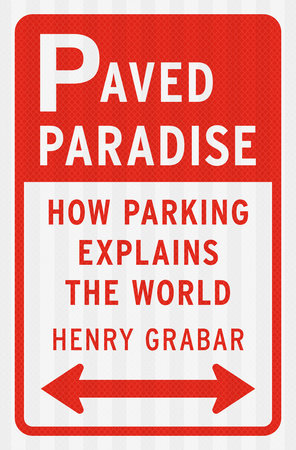
This is a book I heard about because the cranky old communist who runs the local daily paper recommended it in some editorial I’ve long since forgotten the actual point of. Which is generally a very high-risk way to get book recommendations, but in this case it worked out! Though I came into this as the friendliest possible audience for the arguments Grabar is trying to make, so I’m genuinely not that sure how convincing a work it is for a less sympathetic reader. It is at least full of fun and somewhat memorable anecdotes.
The book is about, well, (almost) exactly what it says on the tin – the economics and politics and logistics of parking infrastructure in American cities. Specifically, how it is an all-consuming, economy-warping, environment-destroying, city-killing cancer that is the primary causes of decaying urban cores and the lack of affordable housing in gentrifying neighborhoods. The book is loosely organized, with each different chapter approaching the question of and ills caused by parking from a slightly different angle, or considering the history and psychology that has made it such a mighty force, or showing case studies of how different places have started fixing it.
The two main thrusts of the book are a) parking as an un- (which is to say privately-) regulated privilege and entitlement which the great mass of the American public expects to be provided for free (or for an at-most nominal fee) wherever they happen to want to go and b) parking as possibly the least efficient use of developed real estate in the world, and one that absolutely dominates most American cities.
The latter is a bit less interesting to me, just because it’s broadly things I either already knew or could have pretty quickly puzzled out from what I do. It’s still quite well-presented, and quite rage-inducing – the number of square miles of space set aside for the sole use of free parking on every urban street, the eye-watering amount of money cities spend and give up in revenue to subsidize driving and parking, the hundreds of thousands of units of housing whose economics don’t pencil out because of mandatory parking minimums or that are killed by neighbors and ‘community engagement’ out of (ostensible) concern over their effect on parking availability in the neighborhood, and so on. It’s all well-told, but none of it’s exactly groundbreaking (which Grabar is entirely forthright about, to be clear. A large chunk of the book is combination synopsis and advertisement for the older and more more rigorous The High Cost of Free Parking, also cited as one of the main reference texts).
The former is much more interesting reading for me, just because (as a lifelong and involuntary non-driver) the psychology of it is just a bit foreign to me. The sheer fact that so much parking is both free and unregulated means that instead of market pricing or government permitting all manner of fascinatingly dysfunctional private systems to allocate and ration it out develop instead. Fist fights and murders over stolen parking spots, the self-proclaimed vigilantes patrolling condo parking lots for anyone overstaying their welcome, outright criminal conspiracies and organized violence between ice cream truck companies over poaching each others most lucrative routes – many less morbid and attention-getting things too, to be fair, but it’s still all just fascinating. And if ‘explains the world’ is a bit much, does function as an excellent window into a great many neuroses and dysfunctions of American public life.
One of the points the book repeatedly hammers home is that ‘parking shortages’ are, except in a few extremely select neighborhoods, basically a myth. The parking is almost always there – the average American city has more free or subsidized parking spaces and lots than are filled (at least) 360 days of the year. Drivers just expect parking that is simultaneously no more than a couple blocks from their destination, available the moment they pull up, and (almost) free. Garages go half empty while thousands of road-miles are driven every month circling blocks looking for free spots – terrible for the climate, for the roads being driven on, and for traffic and the utility of driving through the city in the first place. Reducing or eliminating free curbside parking (either charging market-clearing rates, or using the real estate for loading zones or patio seating or any of a thousand other things that serve more people in a period than the same amount of parking) thus often makes traffic better, not worse.
This is very much a book written by a journalist rather than an academic, for both good and ill – not that it doesn’t seem densely researched or well-cited (the endnotes run north of 50 pages), but there’s definitely a prioritization of being approachable and readable over being detailed or rigorous. Hence every chapter having at least one and usually several interviews or deeply characterized anecdotes there to be case studies and examples. Sometimes this anecdotes are incredibly interesting and something I’d probably read a book entirely devoted to – the above mentioned New York City ice cream truck feuds, or the fascinatingly blatant and eye-popping amount of corruption around parking ticketing and violations also in NYC, or how the city of Chicago sold the right to operate all its parking meters through the end of the century to Morgan Stanley – but just as (if not more) often it’s just a few pages sketching a sympathetic portrait and life story of someone suffering the travails of some aspect of parking infrastructure so the reader will have someone to empathize with as the problem is described. A trick that does start t get old the more often it’s repeated.
The book’s long digressions into history were (perhaps unsurprisingly) more interesting for me than the contemporary anecdotes. Partially just because the evolution of things like the car garage and how public streets are conceived of is always interesting to learn more about, and partially because of just how long we have at this point known about things like ‘induced demand’ and the various morbid inefficiencies of car-first, -only and -always culture. Literally generations! It's bleak.
Though having said that, this was funnily enough one of the only works of nonfiction I can remember reading in a long, long time that ended on a positive note in a way that didn’t sound like transparent cope. As is mandatory in all works of pop-sociology, -economics or -poli-sci, this one also ends in a chapter or two of examples of Doing It Right and ways society can fix itself going forward. Grabar just actually weaves together a narrative through most of the book of a slowly-increasing pushback and growing political coalitions who are (in the book’s framing) more interested in cheaper housing and more usable public space than traffic jams and parking lots. The COVID lockdowns and sudden need for as much outdoor space as possible – leading to parking lots being repurposed as church pews, curbside parking as patio seating, and a dozen other things – serve as a case in point. The book ends reiterating the point that the USA’s most desirable and expensive neighbourhoods are very often the ones that are dense and walkable enough (and/or sufficiently well-served by public transit) to comfortably live in without owning a car, and the confident belief that such neighbourhoods are only going to grow more common.
All that said, Grabar’s actually much more sympathetic to the pro-car, pro-parking viewpoint than most authors or pundits I have seen make similar points are. Sometimes to a mildly cringe-inducing ‘no don’t run, I promise I’m normal like you!’ way, being entirely honest. But then, one can at least hope that it helps the book actually function as a persuasive text instead of so much elegant preaching to the choir.
65 notes
·
View notes
Text
Economy Predictions: Part 1 (Post-Trump)
. . • ☆ . ° .• °:. *₊ ° . ☆
Prices will go up by at least 1.5% (accounting for inflation)
Social security collapse or severe downgrade
Trump tries tariffs, they backfire, and he backtracks
Hoover 2.0
We have the equivalent of a second Great Depression Reincarnated
Gas prices temporarily go down, while grocery and other cost-of-living prices skyrocket
Investments in AI companies will perform well, and investments in small businesses will perform more poorly
Some notable companies that haven’t shifted enough online for misc goods will collapse or go bankrupt
It will be much more difficult to be successful as a small business
More pressure on domestic factories causes an increase in demand for Hispanic workers, except ICE depleted available workers
The U.S dollar tanks in value and brings down other currencies dependent on it
The job market is garbage so American citizens and graduates emigrate for work
Massive hit to the agriculture industry as a result of immigration laws
Initially strict regulation becomes more lax again
They never address the temporary food shortage caused by lack of immigrant workers
#donald trump#trump#fuck trump#us politics#usa#politics#united states#election 2024#2028 elections#this was wild to theorize#made a few days ago right before he was inaguarated#so a few r already happening
29 notes
·
View notes
Text
Everybody Wants To Be A Cat 😽
Bucky walked into the house and was met with the angry glare of the boat cat. He blinked, but the cat didn't disappear in that time. He didn't figure it would disappear while he set the groceries down either. He tossed his keys on the table by the door and dropped the extra market bag where it belonged and then went into the kitchen to deposit the groceries and get a better look at the living room.
The cat was sitting on the couch and had shifted itself so it was glaring at Bucky over the arm of the chair instead of over the back of it.
The cat was a scrappy little thing that lived down at the marina. It scavenged fish and picnics and kept the vermin out of the boats. It was too small and lazy to bother the seagulls, or really anything that didn't swim and had been left out in an ice box. It was fairly beloved, even if it kind of felt like he might pick up a disease each time he petted it. It was allegedly black and white, but it mostly looked grey for the salt and filth on it.
"How are you so high up?" Bucky asked it. "You are not big enough to sit above the arm."
One step past the open way between the kitchen and the living room answered his question. The cat was sitting on a lump of blankets, which had an arm sticking out the top. For temperature regulation, he'd been told.
"That cat can't stay in here," Bucky warned. "It's an outside cat."
The mound of blankets opened like a great maw in a horror story and swallowed up the cat from sight. The cat chirped a surprised little sound but allowed itself to be swallowed up. "He came inside all on his own," the mound argued back.
Bucky rolled his eyes and got to sorting out the groceries and putting them where they were supposed to go. Well, at least the cold stuff. The rest could probably wait. "He's a boat cat. He belongs on the boats."
"He's got a wound on his chest. He had to take it easy for a while."
"The sea salt will be good for it." The cat was always scraped up here and there. It would scrap with anything, including loose boards on the docks or the evil raccoons that roamed around. "He's getting fleas all over our stuff. You're gonna end up with that leather couch you don't want."
"A leather couch is a terrible thing to have with a cat in the house."
A leather couch was a terrible thing to have in this God-forsaken heat too. It was an empty threat. "He's not staying in the house."
The cat let out another meow as the mound of blankets hugged it closer. Bucky didn't need x-ray vision to know that that's what had happened. He knew Sam too well. Knew him too well to really expect an outcome to this where they didn't end up with a cat in the house too. Still, he could try.
"I'm allergic to cats," he said.
"You were allergic to cats. You're not allergic to anything now," Sam corrected. "Did you really think that was going to work?"
"I'm about to become allergic to kisses," Bucky threatened emptily.
Sam snorted and didn't even bother justifying that with a response. It really didn't deserve one.
Bucky had not adjusted to being a pet person since breaking free of Hydra. He'd bought a fish once, on a whim in New York, because it looked terrible in the store, but he hadn't adopted a great fondness for it. He eventually gave it to the kids next door who were always complaining at him that the bowl wasn't big enough every time they snooped in through his open front door.
The idea of a cat was daunting.
"You don't even leave extra bait out for him when we go fishing," Bucky pointed out. "Why is he in the house? Why is he your problem now?"
Finally, Sam yanked the blanket off of his head and sat up. The rest of the blanket fell to his lap and Bucky saw he was still dressed for his morning run. Which did not detour to the marina. Just how distracted had Sam gotten this morning? Sam held up the cat by it's armpits (did cats have armpits?) and jostled it gently.
The cat meowed just as gently and let himself dangle there without objection. "Look at him, Barnes. Look at this face. Look at his tummy."
"There are lots of cute tummies that don't live in our house," Bucky pointed out. He gave up on dealing with the groceries and crossed the distance between them so he could sit beside Sam. Even without any attempt to reach out to the thing, the cat bared its teeth at Bucky and squirmed away. He curled up by Sam's hip when Sam put him down.
"I'm naming him Figaro," Sam decided.
"Like...the opera?" Bucky asked. "You watched an opera?"
Sam rolled his eyes. "First of all, if I wanted to watch an opera, I could totally watch an opera. But, no. Figaro like the cat from Pinocchio."
"You know the cat's name from Pinocchio off the top of your head?"
"Yeah. Unlike some people, I pay attention to the movies I watch."
"Sorry, I was worried about the impending world war last time I thought about Pinocchio," Bucky said drily.
Sam rolled his eyes again and threw in an exasperated groan. "Oh my God, gonna play the 40s card again, huh?"
"Are you a cat person, Wilson?" Bucky teased. Sam would continue to ridicule him about the '40s card'. "You pay attention to the cats in the movies. Know their names and everything."
"I like all animals. Cats are quieter than boyfriends," he added.
"Bullshit," Bucky snorted. "Cats are noisy as hell when they want your attention."
"So are super assassin boyfriends," Sam assured. He leaned into Bucky's space, dropping half of his weight against Bucky's chest. "When those things need attention?" He blew a raspberry. "They're so needy. They've got this little whine and they make this weird grumbling noise if you're in front of them but not looking at them."
Bucky laughed and dropped his arms around Sam's waist. "Yeah? You should hear the noises boyfriends with wings make when you're not paying attention to them. Lots of humming. Lots of pointed humming. Why do you do that?"
"I don't know what you're talking about," Sam hummed. He got his arm over Bucky's shoulder and carded his fingers in his hair to pull him down into a kiss. "I'm glad we're agreed that the cat is staying."
"You're bathing it on your own," Bucky said against his mouth.
"A metal hand would be really handy for that, Barnes."
"That's too bad. Wear gloves."
And then, just as Bucky was dipping Sam back and really getting into the kissing, there was an intentional weight on his thigh, heavy and bruising, little pricks of pain stinging through his jeans, and a fuzzy head shoving its way between his mouth and Sam's.
"Oh, he's absolutely not staying inside," Bucky grumbled.
Sam just laughed and cuddled the cat up against his chest as he sat back up. Figaro stared at Bucky, even as he tucked himself closer to Sam.
It was so on.
#sambucky#bucky barnes#sam wilson#figaro the cat#captain america#the falcon and the winter soldier#sambucky fanfic#writing
34 notes
·
View notes
Text
Wings of Fire Drug Headcanons
Dragon drugs are wild Seawings- Jellyfish, Sea Urchin, Little Spinefish, Psychedelic Frogfish, Synchiropus Spendidus, and Pufferfish are the most popular forms of drugs in the seawing kingdom. Most law enforcement will arrest dragons with the position of these fish and the average term in prison for these drugs is 4-6 months. Medics and other forms of doctoral care are allowed to host and keep these drugs for pain reduction uses but must have a license and a clean record, along with permission from the queen to hold. Seawing drugs are the second most powerful drugs in the kingdoms and are sold on a black market to the other kingdoms alongside the Rainwings. Most seawings have a higher tolerance to these drugs than other tribes, so when a dragon from a different tribe takes too much of these drugs, they often wind up overdosing and dying if not reached quick enough. Skywings- Hooded pitohui, European Quail, and Little Shrike-thrush are the choice drugs in the Skywing kingdoms. These birds are highly toxic to dragons outside of the sky kingdom, even hybrids struggle to cope with these drugs. Most sky dragons avoid using these forms of drugs, except outside of medical use on other tribes, because if taken too often or in high dosage they can lead to death. The use of these drugs is not outlawed in the Kingdom of the Sky since not many dragons take these drugs. Rainwings- Rainwings have two categories of drugs, Amphibia and Floral. Golden Poison Dart Frog, Blue Poison Dart Frog, Strawberry Poison Dart Frog, and Pickerel Frog are the most commonly found drugs in the rainwing kingdoms. These frogs are often not limited since they do no harm to the rainwings taking them. However, they are highly toxic to dragons outside of the rainwing kingdom and not sold on the black market to the tribes. These frogs are not monitored in the rain kingdom and there are no regulations on drug use, that is why the overdose rate in the rainwing tribe is so high. Salcia Divinorum, Peyote, Opium Poppies, Cannabis Sativa, Nicotiana Tabacum, Dura Stramonium, Psilocybin Mushrooms, and Myristica Fragrant are the flora drugs in the rainwing kingdom and can be sold on the black market to the other tribes. These plants can be used in many forms that do not require eating such as inhalation, injection, and consumption. Just like the amphibian drugs, these are not regulated or monitored in the rainwing kingdom. The rainforest is the drug capital of the dragon kingdoms and the center of the black market, the queens do not shut this down due to the mass increase of income to all the kingdoms. Icewings- Icewings are HARD on the NO DRUG RULES. The only animal in the ice kingdom that anyone can think of is Orcas. Orca whales are hard to hunt in the ice kingdom and only Icewings can take this form of drug, however, it is outlawed in the ice kingdom to take these drugs. Icewings frown heavily on the use of drugs and it is a criminal offense to use with punishment ranging between 6 and 14 months in prison with probation after release.
Sandwings- Africanized Bee, Coral Snake, Gila Monster, and Hyenas are the choice drugs of the Sandwings with a bit of a mixed reaction towards the collective whole of the kingdom. Some dragons want a ban on drug use excluding medical use while others do not see it as a major problem. Sandwings tend to get most of their drugs from the black market and trade their own drugs since it is not as toxic as most other drugs from other kingdoms.
Mudwings- Mambas, Puffer Adders, Carpet Vipers, and Platypus are the drugs of the mud kingdom and are often monitored heavily by law enforcement. The mudwings have a strict medical use policy stating that, outside of medical use, drug use is frowned upon and highly punishable with a 3-6 month prison sentence if abused. Mudwings tend to produce as many of these drugs as they can seeing as they're not as harsh on the other tribes, these drugs are the most common on the market.
Nightwings- Vampire Bats, Hedgehogs, Solenodon, Shrew, and Slow Loris are the nightwing drugs of choice. All are Mammalia that frequent the kingdom and are sold on the black market, similar to the mudwings. The nightwings have similar medical uses as the mudwings but tend to be a little looser with their free-use laws, stating that nightwings should stay home so as to not disrupt the flow of the kingdom. The nightwings also tend to buy and sell drugs at higher prices than originally bought to broaden income.
#wings of fire#wof headcanon#wings of fire headcanons#I've never really seen any wings of fire drugs talked about#So I thought I'd talk about it#I've thought way too much about dragon drugs#i never thought it would happen to me#but here we are#Orcas are toxic#that's wild
135 notes
·
View notes
Note
weird question, but do you know if regenerative agriculture is growing, and by what rate? it's important to me but looking for articles on my own can trigger a panic attack :[ no worries if not !

Hey! Thank you so much for asking. Honestly, agriculture and sustainable agriculture specifically are very close to my heart as well, so I was glad for the excuse to do some research :)
Also, thank you for your patience, I know you sent this Ask a bit ago. It’s good that you’re listening to yourself and not going around searching for things that might cause you harm, so thanks again for reaching out!
So, what is regenerative agriculture?
Regenerative agriculture is a way of farming that focuses on soil health. When soil is healthy, it produces more food and nutrition, stores more carbon and increases biodiversity – the variety of species. Healthy soil supports other water, land and air environments and ecosystems through natural processes including water drainage and pollination – the fertilization of plants.
Regenerative agriculture is a defining term for sustainability in our food system - while there is no one true definition of regenerative agriculture, the concept has been around for centuries, taking root in Indigenous growing practices. Regenerative approaches can bolster soil health and watershed health. They can also add to climate mitigation and potentially tie into regulatory or commercial incentives for a more sustainable diet.
Regenerative farming methods include minimizing the ploughing of land. This keeps CO2 in the soil, improves its water absorbency and leaves vital fungal communities in the earth undisturbed.
Rotating crops to vary the types of crop planted improves biodiversity, while using animal manure and compost helps to return nutrients to the soil.
Continuously grazing animals on the same piece of land can also degrade soil, explains the Regenerative agriculture in Europe report from the European Academies’ Science Advisory Council. So regenerative agriculture methods include moving grazing animals to different pastures.
How can it help?
Regenerative farming can improve crop yields – the volume of crops produced – by improving the health of soil and its ability to retain water, as well as reducing soil erosion. If regenerative farming was implemented in Africa, crop yields could rise 13% by 2040 and up to 40% in the future, according to a Regenerative Farming in Africa report by conservation organization the International Union for Conservation of Nature and the UN.
Regenerative farming can also reduce emissions from agriculture and turn the croplands and pastures, which cover up to 40% of Earth’s ice-free land area, into carbon sinks. These are environments that naturally absorb CO2 from the atmosphere, according to climate solutions organization Project Drawdown.
5 ways to scale regenerative agriculture:
1. Agree on common metrics for environmental outcomes. Today, there are many disparate efforts to define and measure environmental outcomes. We must move to a set of metrics adopted by the whole food industry, making it easier for farmers to adjust their practices and for positive changes to be rewarded. 2. Build farmers’ income from environmental outcomes such as carbon reduction and removal. We need a well-functioning market with a credible system of payments for environmental outcomes, trusted by buyers and sellers, that creates a new, durable, income stream for farmers. 3. Create mechanisms to share the cost of transition with farmers. Today, all the risk and cost sits with the farmers. 4. Ensure government policy enables and rewards farmers for transition. Too many government policies are in fact supporting the status quo of farming. The food sector must come together and work jointly with regulators to address this. 5. Develop new sourcing models to spread the cost of transition. We must move from sourcing models that take crops from anywhere to models that involve collaboration between off-takers from different sectors to take crops from areas converting to regenerative farming.
The rise of regenerative agriculture
In 2019, General Mills, the manufacturer of Cheerios, Yoplait and Annie’s Mac and Cheese (among other products), announced it would begin sourcing a portion of its corn, wheat, dairy and sugar from farmers who were engaged in regenerative agriculture practices and committed to advancing the practice of regenerative agriculture on one million acres of land by 2030. In early 2020, Whole Foods announced regenerative agriculture would be the No. 1 food trend and, in spite of the pandemic and the rapid growth of online shopping overshadowing the trend, business interest in the field still spiked by 138%.
More recently, PepsiCo announced it was adopting regenerative agriculture practices among 7 million acres of its farmland. Cargill declared it intends to do the same on 10 million acres by 2030, and Walmart has committed to advancing the practice on 50 million acres. Other companies pursuing regenerative agriculture include Danone, Unilever, Hormel, Target and Land O’ Lakes.
According to Nielsen, 75% of millennials are altering their buying habits with the environment in mind. This sentiment, of course, does not always materialize into tangible actions on behalf of every consumer. However, it is clear from the actions of PepsiCo, General Mills, Walmart, Unilever and others that they believe consumers’ expectations of what is environmentally friendly are shifting and that they will soon be looking to purchase regeneratively-produced foods because of the many benefits they produce.
The next step in the transition to regenerative agriculture is certification. The goal is to create labeling that will allow the consumer to connect to the full suite of their values. Some companies are partnering with nonprofit conveners and certifiers. The Savory Institute is one such partner, convening producers and brands around regenerative agriculture and more holistic land management practices.
In 2020, the Savory Institute granted its first “Ecological OutCome Verification (EOV) seal to Epic’s latest high protein bars by certifying that its featured beef was raised with regenerative agriculture practices.
The program was developed to let the land speak for itself by showing improvement through both leading and lagging functions such as plant diversity and water holding capacity. There are now thousands of products that have been Land to Market verified, with over 80 brand partnerships with companies such as Epic Provisions, Eileen Fisher and Applegate. Daily Harvest is giving growers in that space three-year contracts as well as markets and price premiums for the transitional crop. It's focusing on that transitional organic process as a stepping stone toward a regenerative organic food system.
Daily Harvest’s Almond Project creates an alliance with the Savory Institute and a group of stakeholders - including Simple Mills and Cappello’s - to bring regenerative practices to almonds in the Central Valley of California.
These companies are working with Treehouse California Almonds, their shared almond supplier, to lead soil health research on 160 acres of farmland. Over five years, the Project will focus on measuring outcomes around the ecosystem and soil health of regenerative practices – comparing those side by side with neighboring conventional baselines.
“We need industry partnership; we need pre-competitive collaboration,” says Rebecca Gildiner, Director of Sustainability at Daily Harvest, of the Almond Project. “Sustainability cannot be competitive. We are all sharing suppliers, we are all sharing supply – rising tides truly lift all boats. The industry has to understand our responsibility in investing, where historically investments have disproportionately focused on yields with a sole focus of feeding the world. We know this has been critical in the past but it has overlooked other forms of capital, other than financial. We need to look towards experimenting in holistic systems that have other outcomes than yield and profit - instead of saying organic can’t feed the world, we have to invest in figuring out how organic can feed the world because it’s critical.”
////
In short!!!
Many articles are stating regenerative agriculture as a defining, and rising “buzz word” in the industry. It seems that consumers are becoming more and more aware and are demanding more sustainable approaches to agriculture.
We, of course, have a way to go, but it seems from the data that I’ve gathered, that regenerative agriculture is, in fact, on the rise. Demand is rising, and many are working on ways to globalize those methods.
Source Source Source Source
#climate change#climate#hope#good news#climate news#climate crisis#more to come#climate emergency#news#climate justice#agriculture#ecosystem#farming#conservation#biodiversity#regenerative agriculture
93 notes
·
View notes
Note
Hi!! I was just wondering what you think the laws would be around quirks that had monetary value. For example, a girl that can make diamonds, and because of that she and her family are very rich. I feel like in the real world there would be strict regulations around quirks like this though. Maybe it was already mentioned before but I don't remember, just wanted to hear your thoughts.
I'm not certain Quirks could create anything like money or diamonds as their main function. We have "Crystallization" as an example and we know how worthless his diamonds are. For the sake of this though, let's ignore that.
I doubt you'd be allowed to use any Quirks for monetary gain. Considering how much they crack down on non-heroes using their Quirks, I doubt they'd let anyone else use their powers for money. Partly to keep the economy in check, as suddenly introducing a lot of a single resource would be problematic, and partly to keep everything fair. It's not like someone could compete with another construction company that has Cementoss on their payroll. The same would apply for any kind of Quirk that would produce resources. It's likely to fall under any number of charges, like counterfeiting, illegally importation, or even exploitation if someone is forced into it. That's not even mentioning the myriad of health issues that'd come from trying to make and serve food from a Quirk. Obviously, much smaller uses of this would likely be ignored due to how insignificant they are. Quirk usage like that in the setting is seen on the same level as jaywalking. If you can make your own water to help save money on your water bill, use your power to help grow fruit for the farmer's market, or hand out ice cream at your kid's birthday that you made with your Quirk, I doubt that the government would come and stop you. Just as long as you aren't trying to make any kind of sustainable profit or business.
8 notes
·
View notes
Text
This day in history

#10yrago UK police arrest man who built anti-immigrant nail-bomb, decline to press terrorism charges https://www.theguardian.com/uk-news/2014/nov/28/soldier-jailed-nailbomb-ryan-mcgee-manchester-bomb
#10yrsago Library’s seed sharing system threatened by Big Ag regulations https://www.mprnews.org/story/2014/11/30/duluth-librarys-seed-sharing-program-hits-a-hurdle
#10yrsago Haunted Mansion leg sleeve tattoo https://www.reddit.com/r/tattoos/comments/2o20s0/haunted_mansion_leg_sleeve_in_progress_by_darin/
#10yrsago Interview with fantasy writer Tim Powers about being a “secret historian” https://web.archive.org/web/20150103220737/http://likeiwassayingblog.com/2014/12/02/tim-powers-interview-with-a-secret-historian/
#5yrsago McKinsey designed ICE’s gulags, recommending minimal food, medical care and supervision https://www.propublica.org/article/how-mckinsey-helped-the-trump-administration-implement-its-immigration-policies#172207
#5yrsago Frustrated game devs automated the production of 1,500 terrible slot machine apps and actually made money https://www.gdcvault.com/play/1025766/1-500-Slot-Machines-Walk
#5yrsago The Supreme Court just heard the State of Georgia’s argument for copyrighting the law and charging for access to it https://arstechnica.com/tech-policy/2019/12/justices-debate-allowing-state-law-to-be-hidden-behind-a-pay-wall/
#5yrsago UK Apostrophe Protection Society surrender’s, saying “ignorance and lazines’s have won” https://www.standard.co.uk/news/uk/apostrophe-society-shuts-down-because-ignorance-has-won-a4301391.html
#5yrsago MMT: when does government deficit spending improve debt-to-GDP ratios? https://carnegieendowment.org/china-financial-markets/2019/10/mmt-heaven-and-mmt-hell-for-chinese-investment-and-us-fiscal-spending
#5yrsago Using the Challenger Disaster to illustrate the 8 symptoms of groupthink https://web.archive.org/web/20150326031934/https://courses.washington.edu/psii101/Powerpoints/Symptoms of Groupthink.htm
#5yrsago A sweeping new tech bill from Silicon Valley Democrats promises privacy, interoperability, and protection from algorithmic discrimination and manipulation https://web.archive.org/web/20191105215639/https://eshoo.house.gov/news-stories/press-releases/eshoo-lofgren-introduce-the-online-privacy-act/
#5yrsago Harry Shearer interviews Uber’s smartest critic: Hubert “Bezzle” Horan https://harryshearer.com/le-shows/december-01-2019/#t=10:10
#5yrsago Reading the “victory letter” a white nationalist sent to his followers after getting $2.5m from UNC, it’s obvious why he tried to censor it https://twitter.com/greg_doucette/status/1201547992748216322
#5yrsago “Harbinger households”: neighborhoods that consistently buy products that get discontinued, buy real-estate that underperforms, and donate to losing political candidates https://journals.sagepub.com/doi/abs/10.1177/0022243719867935
#5yrsago White nationalists who got a $2.5m payout from UNC abuse the DMCA to censor lawyer’s trove of documents about it https://twitter.com/greg_doucette/status/1201635924158881792
6 notes
·
View notes
Text
Over 2000 illegal betting sites still live in Brazil, ANJL echoes Anatel’s concerns over “inefficient” IP blocking
ANJL reveals of 2000 illegal sites are still operating in Brazil. This follows president of the telecom's regulator (Anatel) chief Carlos Baigorri's warning that blocking illegal betting sites is an inefficient measure.

Earlier this week, Anatel’s chief Baigorri warned that it was struggling to sufficiently block all the illegal betting sites that gambling regulator, the Secretariat of Prizes and Bets (SPA), had deemed illegal ahead of the licensed betting market’s launch on 1 January 2025.
The SPA sent details of over 5,200 domains belonging to illegal betting sites to Anatel in November as it sought to crackdown on the illegal market. The regulator was tasked with ensuring those domains were taken down but Baigorri this week likened Anatel’s efforts to “mopping up ice,” admitting the agency lacks the capacity to block all illegal sites.
The ANJL supports Baigorri’s sentiments, calling for “urgent blocking” to deal with the “alarming scenario of proliferation” of illegal sites.
It is widely known in the sector that illegal operations are quick to circumnavigate IP blocking efforts by launching mirror sites to direct payers to once one domain has been taken down.
Continue reading.
3 notes
·
View notes
Text
The Ultimate Forex Brokers Comparison for South African Traders
Introduction:
The forex market in South Africa is one of the fastest-growing financial sectors, and selecting the right broker can make all the difference. In this Forex Brokers Comparison in South Africa, we will explore the best options available for traders in 2025. Whether you're just getting started or are looking for a more advanced trading experience, this guide will help you navigate your choices and make an informed decision.

Why Forex Trading in South Africa is Thriving:
Forex trading in South Africa has seen a steady rise in popularity over the past few years. This growth can be attributed to the country's stable financial regulations, mainly governed by the Financial Sector Conduct Authority (FSCA). With a secure regulatory framework, traders are assured of a safe trading environment. In addition, many brokers now offer dedicated services tailored for South African traders, including local deposit methods and customer support in native languages.
Key Features to Look for in a Forex Broker in South Africa:
When choosing a forex broker, several key factors should guide your decision:
Security and Regulation: Ensure your broker is regulated by the FSCA for a secure trading environment.
Trading Platforms: Popular platforms such as MT4 and MT5 offer robust features, but many brokers now offer proprietary platforms as well.
Low Spreads and Fees: Low trading costs are crucial to maximizing profits.
Customer Support: 24/7 support in the South African time zone can enhance your trading experience.
Account Types: Brokers offering diverse account types with local payment options can cater to a wide range of traders.
Top Forex Brokers for South African Traders in 2025:
Eightcap: Known for its low spreads, quick deposits, and intuitive platform, Eightcap is perfect for both beginners and seasoned traders.
IC Markets: With low spreads and fast execution, IC Markets is ideal for scalpers and day traders.
FP Markets: Offering excellent customer support and a user-friendly platform, FP Markets provides an outstanding trading experience.
Octa: Specializing in accounts suitable for South African traders, Octa stands out for its commitment to local customers.
BlackBull: If you're after low-cost trading with access to a wide range of assets, BlackBull is a top contender.
XM: XM’s global reach and local support make it a solid choice for traders looking for both global opportunities and local assistance.
FXPro: Known for its top-tier services and robust tools, FXPro is ideal for traders seeking a complete package.
FBS: FBS’s user-friendly interface and attractive promotions make it an appealing option for beginners.
Comparing Forex Brokers in South Africa: Which One is Right for You?
Choosing the right broker depends on your trading needs. For beginner traders, brokers with easy-to-use platforms and strong customer support, like FBS and Eightcap, might be the best fit. Experienced traders, however, may benefit from IC Markets or FP Markets, which offer advanced tools and low-cost trading. If you're focused on low spreads, BlackBull and Octa are excellent options.
The Future of Forex Trading in South Africa:
As we look toward 2025, the future of forex trading in South Africa appears promising. Technological advancements, such as AI-based trading tools and faster transaction systems, are set to make trading more efficient. Moreover, evolving regulations may offer even greater protection for traders. Staying informed about the latest trends and innovations will help traders maintain a competitive edge.
Conclusion:
In conclusion, choosing the right forex broker is critical for successful trading in South Africa. With the Forex Brokers Comparison in South Africa above, you are equipped with the knowledge to make an informed decision. Visit Top Forex Brokers Review for more in-depth insights and to explore detailed broker reviews
2 notes
·
View notes
Text

After hearing about what mortals do on Christmas day, Marya took on a trip back to Transylvania to shop at monster markets for crafted crystal ball sized pearls and crystal stars lit by fire wisps, wooden spider web threads, twigs, liles and laurel leaves for making wreaths, and lastly but not least, a tree freshly planted onto a large gardening pot. Teddy comes along to the trip to have some adventure time with Marya away from crime stuff.
Then they come back home and Marya sets the stuff up for the Lobo manor as Christmas decor so the Lobos don't have to. After she is done, the living room tree glows in the dark like a light projector. The crystals are used as ornaments and the treetopper crystal star even floats and slowly turns to make auroras thanks to Marya's ring magic. Teddy is fascinated by such beauty!
Art inspiration: As Christmas was getting closer, I mused about how these 2 cuties would spend Christmas time, and this is one of the scenarios I came up with lol. It was also an opportunity for me to get creative with fantasy settings, so here I came up with a Christmas tree containing spider webs and magical glowy gems.
These ornaments would look so GORGEOUS and even waterproof, meaning the tree can be watered on with causing electricity difficulties. The real tree in the house would've smelled so amazing! Maybe that's why is was Marya's idea: To expose the Lobos to the more earthy smells of the world. Sure she could just let them use the money they have to the decor they're already used to, but they just can't beat the real natural stuff! The spider webs is used as natural twinkle light strings that is also sticky enough for the gems to stick onto. I'm sure the sticky spider webs would be a pain in the ass to wrap/unwrap around the tree itself, but hey, it's fantasy, logic can be broken! XD
Also out of all the types of flowers I could think off, why lilies? Because I have a funny feeling hearing the lily word would remind Marya of... Well... Lili. I think she'll feel very bad for what has become of that girl because of her, and taking a liking to lily flowers is her way to atoning herself for that incident. :C
For anyone wondering Marya is shown out in daylight without burning, I hc that when the weather chills during winter, Marya discovers she can now walk out in the sun with little to no sunburn and she has been happily enjoying life to the fullest since then. Taking walks, hanging out in flower fields, napping on the sunkissed ground, etc. Of course while the sun still makes her skin feel slightly warm and her powers are still significantly weakened, her skin doesn't start smoking and inflaming the moment she steps one foot outdoors compared to the summertime. It's as if she had already found the cure to her curse without trying. :3
She should be careful though bc on the other hand, while vampires easily catch on fire from being exposed to the hot sun, I'll also like to explore the concept of the reverse occurring and vampires instead turning into ice when exposed to the freezing cold night for too long. Geez! Body temperature regulations sure isn't vampires' strong suit amiright? XD
As you can see here, Teddy's outfit is white pajamas with a grey wolf head on the center of his top. Marya's pajamas is actually based on a post the official Universal Monsters Instagram posted on the 20th and the last slide pic shows her in a Christmas edit wearing what it looks like Santa pajamas with an elf hat! 😍
If you see a comment on there saying "DRACULAS DAUGHTER ACKNOWLEDGED 👀👀👀👀👀👀💖🥳" That's me! :D
Here's my manip of what I think the pic would look like colorized ↓

#Universal Monsters#Dracula's Daughter#Renfield 2023#Renfield#Marya Zaleska#Draculaura#Tedward Lobo#Teddy Lobo#Draculobo#Marward#Teddy X Marya#Teddy/Marya#OTP: She gives him that weird feeling#My OTP <3#My babies <3#Vampire X Werewolf#Cloudy's stickmen adventures#Fan art#Christmas
4 notes
·
View notes
Text

Construction Project Manager Carneline has a lot of her plate at the family business. The last thing she needs is romance. But Josie, the skilled superintendent, is complicating things one iced coffee at a time.
If you know, you know. 😈
A COMMON BOND by T. M. KUTA
A 🌶️🌶️🌶️ Colleagues-To-Lovers lesbian romance novella set in the queerest small town ever.
Out November 7, 2023!
FREE SAMPLE: HERE!
PRE-ORDER NOW!
[ID: A marketing image for T.M. Kuta's lesbian romance novella, A Common Bond. It is peach. On the right is a copy of the novella cover, with a white woman with curly red hair holding a to-go coffee container with the text A COMMON BOND by T.M.Kuta and A Clover Hill Romance in white with a blue outline. The marketing text says DEBUT LESFIC NOVELLA and "Y’know, where I come from “wearing a harness” meaning something completely different. 😈 OSHA Regulation 1910.140 - Personal Fall Protection System"]
14 notes
·
View notes
Text
5 Tips to Keep Your Dog Warm in the Winter
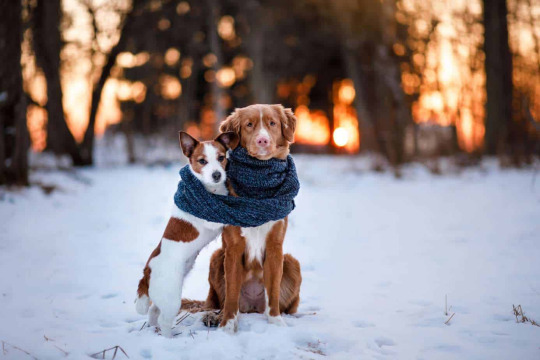
Invest in doggy outerwear - sweaters, hoodies, jackets, vests, even shoes! There's a whole market of pet clothing nowadays. One of our favorite brands of K9 outerwear is Canada Pooch
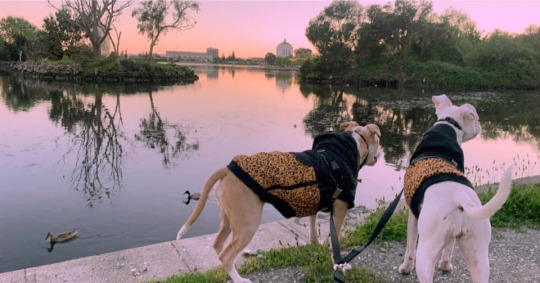
It's important to note that not every dog's coat may be enough to keep them warm in the winter - especially puppies, small or hairless breeds, elderly dogs, or those with health issues. Just like with people, pets' cold tolerance can vary based on their coat, body fat stores, activity level, and health. Pets with heart disease, kidney disease, or metabolic diseases like diabetes and Cushing's might also have a harder time regulating their body temperatures.
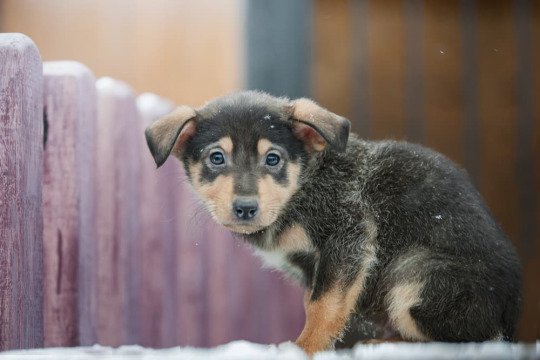
Protect your dog's paws when it's snowing. Boots can help minimize contact with the ground and prevent snow and ice from getting lodged between their toes and causing frostbite. Like chapped lips, cracked paws can be annoying and painful, and built up snow and ice can irritate their sensitive skin between their toes.
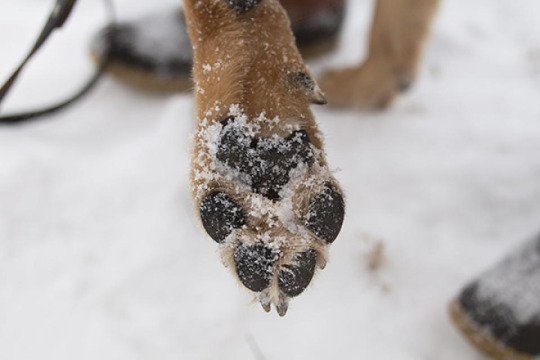
It might feel awkward at first for some dogs, so try to use positive reinforcement as they try to adjust to wearing their boots. Offer high-reward treats so they can learn to associate good things with their boots - when the boots are on, good things are going to happen! :)
youtube
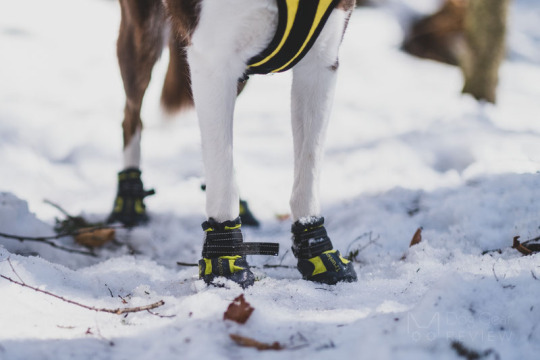
If boots still don't feel right for your dog, you can try applying paw balm or petroleum jelly-based products like Musher's Secret to keep your dog's paws safe and moisturized.

Just always be sure to wipe down and clean your dog's paws thoroughly with with a warm cloth when they come back inside. Sometimes salt and anti-freeze are put on sidewalks and driveways, which can cause chemical burns on your pet's paw pads or gastrointestinal issues if they try to lick it off.
Limit their time outdoors. Winter walks aren't always so magical. Know your dog's limits and shorten their walks if needed. If you can, reserve walks for the warmest parts of the day.
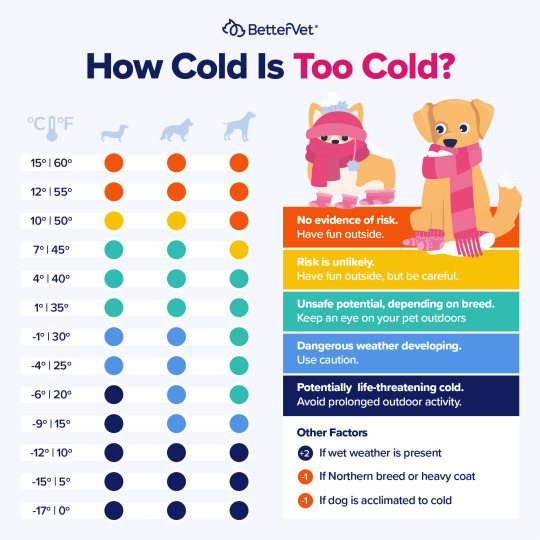
Signs to tell if your dog is too cold: - Shaking, shivering, or trembling - Hunched posture with tail-tucking - Slowing down or reluctant to walk/move - Lifting their paws off the ground - Whining or barking - Ears and nose feel very cold to the touch Even if you decide to leave your dog in the car while you run an errand, it can still be dangerous if they are left for too long without any heat support when its below 30 degrees F outside. While cars can trap blazing temperatures in the summer and open risk for heatstroke, they can also trap freezing temperatures in the winter and open risk for hypothermia. Perhaps try to sit in your car without a jacket and see how long you can bare waiting in there without the heater on.
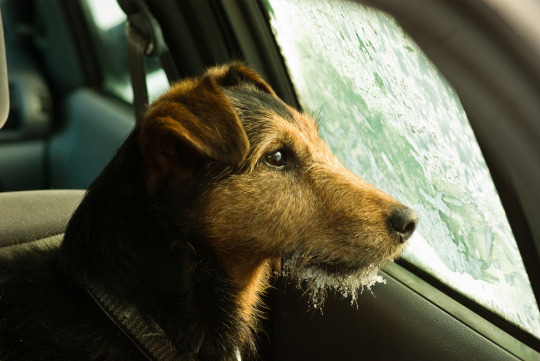
Provide choices! Give your dog more options for comfortable sleeping places with varying levels of bedding and blankets, in case they need to change their location for more or less warmth.

Set up cozy, wet-proof areas outdoors with heating lamps and wind barriers. Make sure kennels and igloos/houses are well-insulated and have enough space for them to walk in, turn around, and comfortably lay in.
youtube
Unless you have a healthy conditioned sled dog, I would not recommend letting them spend the night outdoors in the snow, without proper shelter and heat support. Watch how cold it can get in a simple dog house:
youtube
Serve warm food and water. At minimum, aim to make sure whatever they consume is at room temperature - but preferably just above their body temperature (101-103 F) when it's especially cold. Warming their food will also bring out their aroma and make it more enticing for them to eat. If feeding kibble/dry or dehydrated, you can mix in some warm bone broth. If it's canned/wet food, avoid microwaving for too long, as this can make the food too hot and potentially deplete its nutrients. Instead, try warming up your dog's wet food with this technique:
As for home-cooked/fresh food, the Balance It Canine Plus supplement not only makes your dog's complete and balanced, but is actually formulated to withstand reheating/microwaving. Our personal favorite! Below is a tutorial on how to utilize the Balance It system:
youtube
When selecting ingredients for your dog's food in the winter, consider including "warming" foods according to TCVM food energetics. Examples of these would be meats like lamb, goat, or venison, and vegetables and starches like sweet potatoes and oats. Traditional Chinese medicine teaches that hot/warm food nourishes the body by bringing heat which improves circulation. To support this theory, some studies have found that food associated with heat consists of compounds that are on average lower in molecular weight, yet higher in protein and fat - which contribute to energy production, and magnesium and potassium - which contribute to blood pressure and nerve function.(https://www.sciencedirect.com/science/article/pii/S2666154320300247) Here is a list of some hot/warm commercial pet food and treats: - SideBySide Pet "Warming" - Dr. Judy Morgan's Fire Element Diet - Pet Tao "Blaze" Freeze Dried Raw Formula - JustFoodForDogs Venison & Squash Recipe - JustFoodForDogs Lamb & Rice Recipe
For more information on food energetics, watch this video:
youtube
5 notes
·
View notes